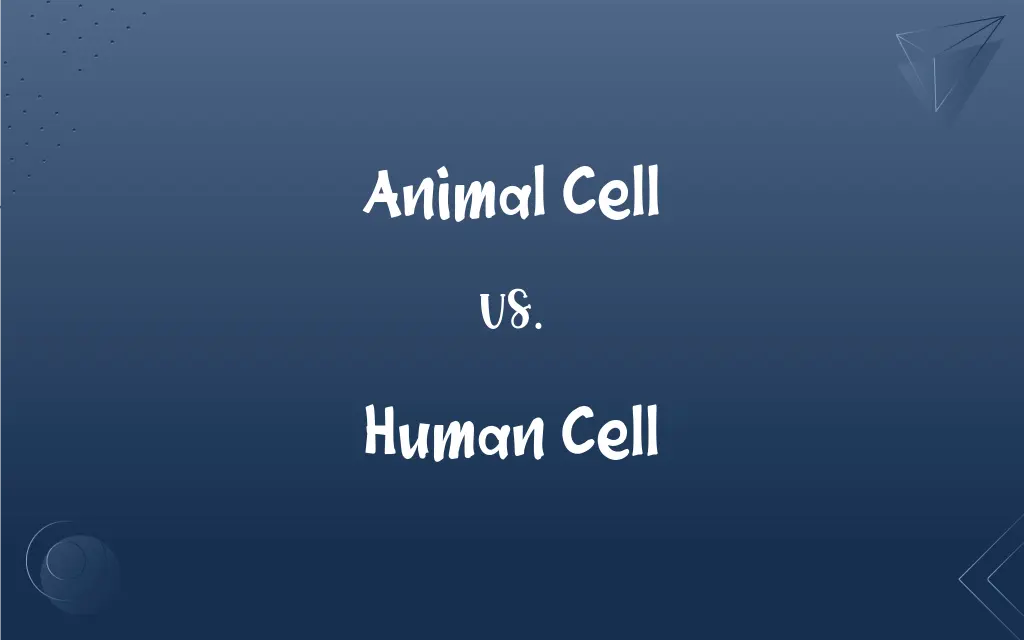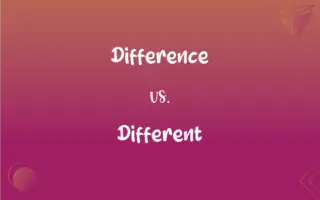Animal Cell vs. Human Cell: What's the Difference?
Edited by Aimie Carlson || By Janet White || Published on December 31, 2023
Animal cells are the basic unit of life in organisms of the kingdom Animalia, having a variety of forms and functions, while human cells are specific animal cells with characteristics unique to humans, like specific protein markers.

Key Differences
Animal cells vary widely in shape and function, adapted to the needs of different species, from nerve cells in birds to muscle cells in mammals. Human cells, a subset of animal cells, are specialized for functions unique to the human body, like neurons in the brain or cardiomyocytes in the heart.
The size of animal cells can range significantly, from tiny cells in microscopic organisms to larger cells in larger animals. Human cells are generally consistent in size, fitting within a range specific to humans, adapted to support human body functions.
Animal cells across different species can have a variety of surface markers and proteins, which differ based on evolutionary paths. Human cells have specific surface markers like human leukocyte antigens (HLAs), crucial for immune system functioning.
The genetic material in animal cells varies greatly, with different numbers of chromosomes and genetic sequences across species. Human cells contain 46 chromosomes, with a genetic makeup unique to the human species.
In terms of cellular metabolism, animal cells can have different metabolic pathways adapted to their ecological niches. Human cells have metabolic processes optimized for human physiology, like brain cells using glucose for energy.
ADVERTISEMENT
Comparison Chart
Shape and Function
Varied across species
Specialized for human body functions
Size
Ranges widely depending on the species
Generally consistent within human range
Surface Markers
Diverse across species
Specific markers like HLAs
Genetic Material
Varies in chromosomes and sequences
Contains 46 chromosomes, human-specific
Cellular Metabolism
Adapted to ecological niches
Optimized for human physiology
ADVERTISEMENT
Animal Cell and Human Cell Definitions
Animal Cell
A eukaryotic cell with a nucleus and organelles, enclosed by a plasma membrane.
Animal cells contain mitochondria for energy production.
Human Cell
A unit in the human body, specialized for various roles.
Neurons are human cells that transmit nerve signals.
Animal Cell
A component of animal tissue, contributing to its function.
Animal cells in the liver are specialized for detoxification.
Human Cell
A basic building block of human tissues and organs.
Human cells in the heart muscle contract to pump blood.
Animal Cell
A cell with the ability to differentiate into various cell types.
Stem cells in animals can develop into different types of animal cells.
Human Cell
A cell that constitutes the human body, carrying human DNA.
Each human cell contains genetic information unique to the individual.
Animal Cell
The basic structural and functional unit of animals.
The muscle tissue consists of numerous animal cells.
Human Cell
A eukaryotic cell specific to humans, with complex structures.
Human cells in the skin protect the body from external harm.
Animal Cell
A cell that lacks a cell wall, unlike plant cells.
In animal cells, the shape is maintained by the cytoskeleton.
Human Cell
A cell capable of performing functions essential for human life.
Red blood cells are human cells vital for oxygen transport.
FAQs
Are human cells a type of animal cell?
Yes, human cells are a specific type of animal cells, specialized for humans.
Can animal cells regenerate?
Some animal cells can regenerate, but this ability varies by species and cell type.
Can animal cells photosynthesize?
No, animal cells lack chloroplasts and cannot photosynthesize.
Do all animal cells have the same structure?
No, animal cells vary in structure depending on their function and species.
What is the main function of animal cells?
Animal cells function to support the life and activities of the animal they belong to.
What is unique about human cell DNA?
Human cell DNA is unique to each individual and specific to the human species.
How many chromosomes are in a typical human cell?
A typical human cell contains 46 chromosomes.
What is the lifespan of a human cell?
The lifespan of human cells varies, from days (like skin cells) to the lifetime of the individual (like neurons).
Are animal cells larger than plant cells?
The size of animal cells is generally similar to plant cells, but this can vary.
Do animal cells have a cell wall?
No, animal cells do not have a cell wall, unlike plant cells.
Can animal cells adapt to different environments?
Yes, animal cells can adapt to different environments within the organism's body.
How do human cells communicate with each other?
Human cells communicate through chemical signals, such as hormones and neurotransmitters.
Do animal cells contain mitochondria?
Yes, animal cells contain mitochondria for energy production.
Can animal cells change their function?
Some animal cells, like stem cells, can differentiate into various types of cells.
What types of cells are found in human blood?
Human blood contains red blood cells, white blood cells, and platelets.
What is the main energy source for human cells?
Glucose is the primary energy source for most human cells.
How do human cells respond to damage?
Human cells can respond to damage with repair mechanisms, or in some cases, apoptosis (programmed cell death).
What is the role of the nucleus in human cells?
The nucleus controls cell activities and contains the cell's genetic material in human cells.
What organelles are common in animal cells?
Common organelles in animal cells include the nucleus, mitochondria, and endoplasmic reticulum.
Are all human cells identical?
No, human cells vary in shape and function depending on their role in the body.
About Author
Written by
Janet WhiteJanet White has been an esteemed writer and blogger for Difference Wiki. Holding a Master's degree in Science and Medical Journalism from the prestigious Boston University, she has consistently demonstrated her expertise and passion for her field. When she's not immersed in her work, Janet relishes her time exercising, delving into a good book, and cherishing moments with friends and family.
Edited by
Aimie CarlsonAimie Carlson, holding a master's degree in English literature, is a fervent English language enthusiast. She lends her writing talents to Difference Wiki, a prominent website that specializes in comparisons, offering readers insightful analyses that both captivate and inform.






































































